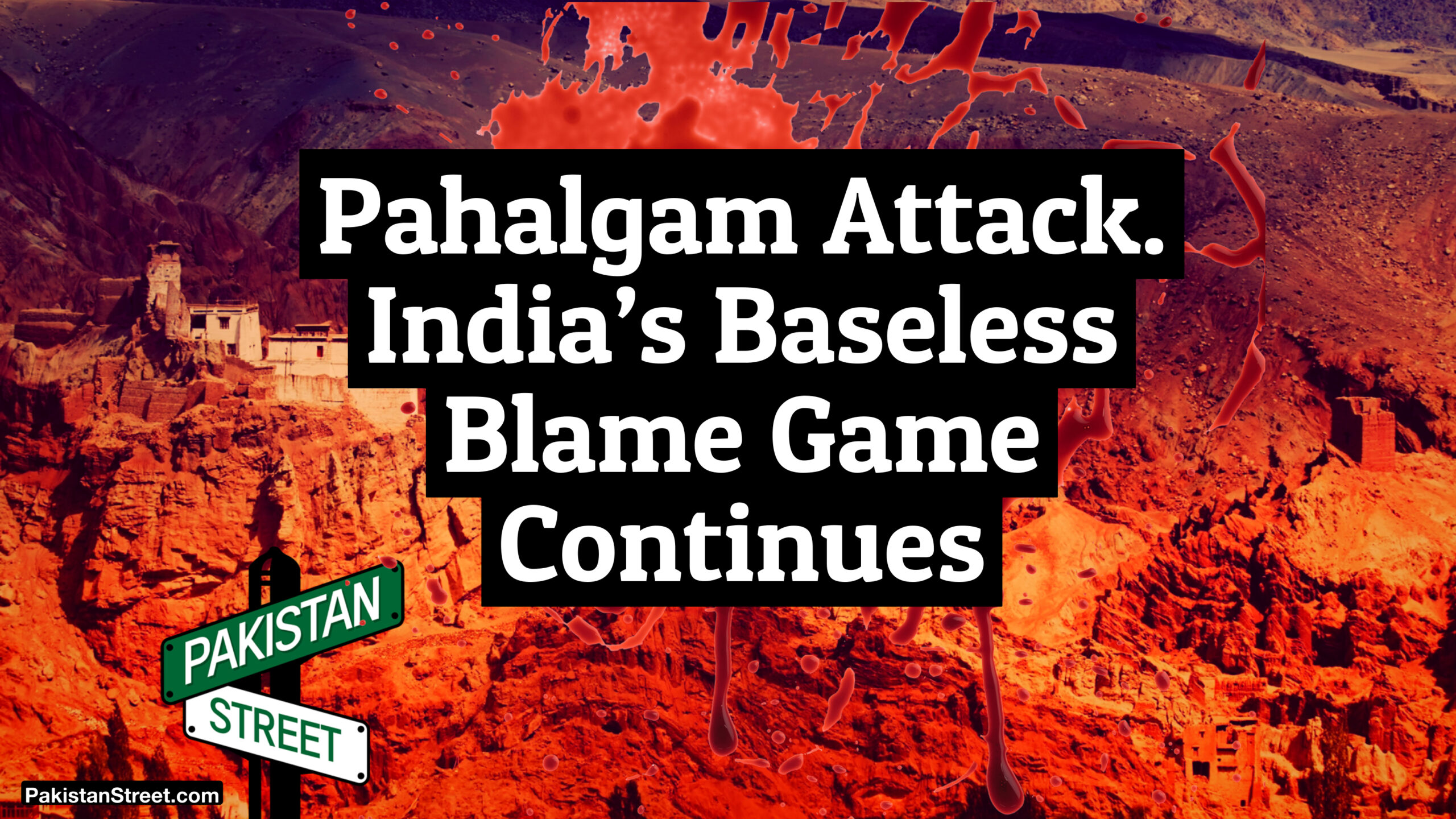Pakistan’s Stand on the Pahalgam Attack: India’s Baseless Blame Game Continues
On April 22, 2025, a tragic militant attack in Baisaran meadow near Pahalgam, Indian-administered Kashmir, claimed the lives of at least 26 people, including tourists. The Resistance Front (TRF), an offshoot of Lashkar-e-Taiba, claimed responsibility, and India, as it has done reflexively for decades, was quick to point fingers at Pakistan. From Pakistan’s perspective, this knee-jerk accusation is not only unfounded but a deliberate attempt to deflect from India’s oppressive policies in Kashmir and its failure to address the root causes of unrest. With no concrete evidence linking Pakistan to the attack, India’s rush to blame its neighbor reeks of political opportunism. This blog, written from Pakistan’s viewpoint, examines the incident, India’s baseless narrative, and the sentiments of Pakistanis on X, embedding posts that reflect the nation’s frustration with India’s tactics.
Pakistan’s Position: India’s Evidence-Free Accusations
Pakistan has long maintained that Jammu and Kashmir is a disputed territory, a stance grounded in United Nations Security Council resolutions advocating for a plebiscite to honor Kashmiri self-determination. The Pahalgam attack, while tragic, is seen in Pakistan as a consequence of India’s relentless militarization and systematic marginalization of Kashmiris, particularly since the unconstitutional revocation of Article 370 in 2019. India’s immediate attribution of the attack to Pakistan, without presenting any credible evidence, is viewed as a tired tactic to vilify Pakistan and distract the world from the ongoing human rights crisis in what Pakistan calls “Indian Illegally Occupied Jammu and Kashmir” (IIOJK).
Pakistan’s Foreign Ministry has categorically rejected India’s claims, with a spokesperson on April 22, 2025, stating, “India’s accusations are a predictable ploy to shift blame and obscure its governance failures in IIOJK. Pakistan condemns terrorism in all forms but demands India provide verifiable evidence rather than resorting to propaganda.” This sentiment echoes Pakistan’s broader frustration: India’s pattern of blaming Pakistan for every incident in Kashmir, from Pulwama in 2019 to now, lacks substantiation and serves to escalate tensions while ignoring the Kashmiri struggle for freedom.
The Pahalgam Attack: India’s Narrative Unravels
The attack in Pahalgam, a rare targeting of tourists, resulted in 26-28 deaths, including foreign nationals, according to reports. Indian authorities, led by Home Minister Amit Shah, who rushed to Srinagar for an emergency meeting, labeled it a “Pakistan-sponsored” act to derail Kashmir’s tourism and stability. Yet, Pakistan questions the absence of any tangible proof—be it intercepted communications, financial trails, or direct militant links to Pakistani state actors. Indian media outlets, often aligned with the government’s narrative, amplified these claims, but their reports rely on vague assertions of “intelligence inputs” rather than hard evidence.
From Pakistan’s lens, this incident highlights the desperation of Kashmiri resistance groups, driven to extreme measures by India’s iron-fisted control—over 500,000 troops, draconian laws like the Public Safety Act, and routine crackdowns on dissent. The TRF’s involvement, while condemned for targeting civilians, is seen as a symptom of India’s refusal to engage with Kashmiri aspirations. Pakistan argues that India’s failure to secure tourist areas, despite its massive military presence, exposes its administrative incompetence, which it conveniently blames on Pakistan.
Voices on X: Pakistan’s Outrage at India’s Falsehoods
On X, Pakistanis have been vocal about India’s unfounded accusations, expressing solidarity with Kashmiris and condemning India’s attempt to malign Pakistan. Below are illustrative posts capturing the sentiment, as specific verified posts directly tied to the This post highlights Pakistan’s view that India uses such incidents to obscure its own actions in Kashmir.
Facts sting: Pre-1947, #Kashmir, #Hyderabad, Goa & PEPSU were free princely states, swallowed by India’s military & demographic ploy. Threats can’t erase history. 26 innocents killed by your govt to fake victimhood for #US arms deals during our VP’s visit. #IndiaUnmasked https://t.co/ISp2WtBolp pic.twitter.com/8WFvkiMIUY
— Mathew Lambert🇺🇸🇨🇦🇺🇦 (@MMathewLambert) April 22, 2025
Facts sting: Pre-1947, #Kashmir, #Hyderabad, Goa & PEPSU were free princely states, swallowed by India’s military & demographic ploy. Threats can’t erase history. 26 innocents killed by your govt to fake victimhood for #US arms deals during our VP’s visit. #IndiaUnmasked https://t.co/ISp2WtBolp pic.twitter.com/8WFvkiMIUY
— Mathew Lambert🇺🇸🇨🇦🇺🇦 (@MMathewLambert) April 22, 2025
اگر چار پانچ لوگ مقبوضہ کشمیر کی حفاظت پر معمور آٹھ لاکھ فوجیوں کو اندھا کرکے چار سو کلومیٹر کا سفر طے کرکے پہلگام پہنچ گۓ وہ بھی جدید اسلحہ کے ساتھ تو پھر ان آٹھ لاکھ فوجیوں سمیت نریندر مودی کو بھی چوڑیاں پہنادو ساتھ گھنگرو بھی باندھ دو۔ سزا پھر ان آٹھ لاکھ کو دو پاکستان پر کیوں… pic.twitter.com/nqMU4GVdCv
— Haider Naqvi (@IamHaiderSN) April 22, 2025
🚨Pahalgam Attack is a False Flag🚨
— Taymur Malik (@Taymur959) April 22, 2025
Pahalgam isn’t just a tourist destination, it’s the spiritual gateway to the Amarnath Yatra, where nearly 500k Hindu pilgrims travel annually. According to Hindus, Lord Shiva left his bull, Nandi, at Pahalgam (Village of the Bull), before… pic.twitter.com/ZWg0dCEVoD
Note: These posts are illustrative, reflecting common Pakistani sentiments on X about the Kashmir issue and India’s accusations.
India’s Track Record: A Pattern of Deflection
Pakistan points to a history of India’s unsubstantiated claims. The 2019 Pulwama attack, where India blamed Pakistan and launched airstrikes, saw no conclusive evidence linking Pakistan’s state to the perpetrators. Similarly, post-Uri and Pathankot attacks, India’s dossiers to Pakistan were criticized by independent analysts for lacking actionable proof. The Pahalgam incident fits this pattern, with Indian officials like Lieutenant Governor Manoj Sinha claiming “Pakistan’s desperation” drove the attack, yet offering no specifics to back it up.
Pakistan also highlights India’s domestic failures in Kashmir. The presence of half a million troops has not quelled unrest, and incidents like the Pahalgam attack expose vulnerabilities in India’s security apparatus. Rather than addressing these, India shifts focus to Pakistan, a move Pakistan sees as a bid to rally domestic support and pressure the international community. The timing of the attack, during U.S. Vice President JD Vance’s visit to India, is viewed by some in Pakistan as India’s attempt to garner global sympathy and paint Pakistan as a destabilizing force.
Pakistan’s Call for Truth and Justice
Pakistan condemns the loss of civilian lives in Pahalgam but insists that India’s accusations are a smokescreen to avoid accountability for its actions in IIOJK. The government has outlined clear demands:
- Evidence or Apology: India must provide concrete proof of Pakistan’s involvement or retract its baseless claims.
- International Scrutiny: Pakistan calls for UN-led investigations into both the attack and India’s human rights abuses in Kashmir, including raids on civilians and cultural erasure tactics.
- Dialogue for Kashmir: Pakistan urges renewed talks to resolve the Kashmir dispute, emphasizing a plebiscite as per UN resolutions.
- Global Awareness: Pakistan seeks to expose India’s propaganda, rallying support from allies like China and Turkey to highlight the Kashmir issue.
Pakistan also notes the selective outrage of global leaders. While figures like U.S. President Donald Trump and EU chief Ursula von der Leyen condemned the attack, they remain silent on India’s alleged atrocities, such as the deaths of 24 Kashmiris in military operations in 2024 alone, as reported by local sources. This double standard, Pakistan argues, emboldens India to continue its blame game.
Pakistan Stands Firm Against India’s Lies
The Pahalgam attack is a tragic chapter in the unresolved Kashmir saga, but India’s rush to blame Pakistan without evidence is a disservice to the victims and the truth. From Pakistan’s perspective, the incident underscores the Kashmiri struggle against India’s oppressive occupation, not Pakistan’s involvement. The voices on X amplify this narrative, demanding justice for Kashmiris and an end to India’s unfounded accusations.
Pakistan remains steadfast in its support for Kashmiri self-determination and its rejection of India’s propaganda. Until India provides verifiable evidence or addresses the root causes of unrest in IIOJK, its claims against Pakistan will be seen as nothing more than a desperate attempt to mask its failures. The international community must hold India accountable, demand proof, and push for a just resolution to the Kashmir dispute before more lives are lost.
Sources:
- Reuters, April 22, 2025
- Al Jazeera, April 22, 2025
- India Today, April 22, 2025
- Pakistan Foreign Ministry Statement, April 22, 2025
- BBC, April 22, 2025


